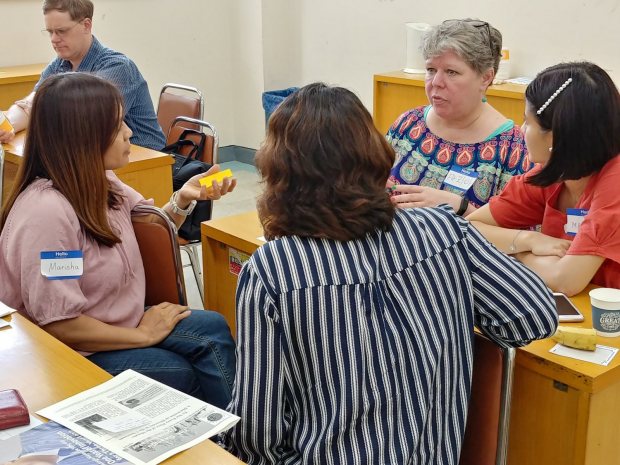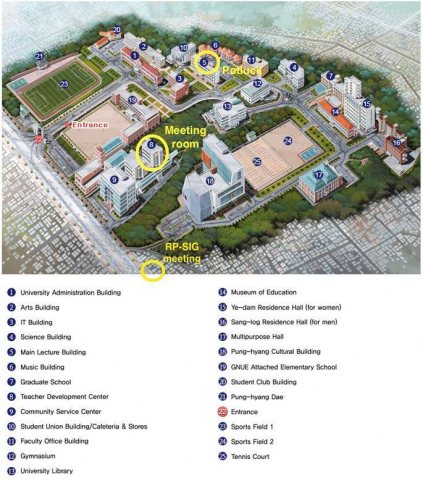
Gwangju-Jeonnam KOTESOL November Meeting
––– Morning Reflective Practice Session –––
Topic: Reflection on Teacher Identity at the End of 2019
Facilitator: Kristy Dolson
Time: November 16, 2019; 11:00ㅡ12:30 (3rd Saturday)
Location: Coffee Lab Mujii, near GNUE. (Ground floor of 광주우리교회 Building. Map at bottom.)
––– MAIN MEETING SCHEDULE –––
Time: 3rd Saturday, November 16, 2019, 1:45ㅡ5:00 pm
Location: Gwangju National University of Education (GNUE), Teacher Training Center (교사교육센터) 1st Floor; Room 812. Detailed directions HERE.
1:45 pm: Sign-in and Meet-and-Greet (Admission: Free for newcomers. Membership welcomed.)
2:00ㅡ3:20 pm: Presentation 1
ㅡ Topic: Creating a Space for Students with Disabilities and Neurodiversity in the Classroom
ㅡ Presenter: Crystal Soo-Jung Cho Jones (Indiana University)
3:20ㅡ3:40 pm: Refreshment Break
3:40ㅡ4:30 pm: Presentation 2
ㅡ Topic: Technology: A Crucial Tool in the EFL Classroom
ㅡ Presenter: Peter Lucarotti (Jeollanamdo International Education Institute)
4:30ㅡ4:35 pm: Refreshment Break
4:35ㅡ4:45 pm: Chapter Elections
4:45ㅡ4:55 pm: SwapShop Mini-Presentations
Share your Teaching Ideas, Classroom Activities, and Teaching Wisdom with the group.
(Everyone is encouraged to share [up to 5ㅡ6 min. each]. Short tidbits are welcomed. Handouts also welcomed.)
4:55ㅡ5:00 pm: Announcements / Drawing for Door Prizes / Closing
Session Summaries
Creating a Space for Students with Disabilities and Neurodiversity in the Classroom
Crystal Soo-Jung Cho Jones (Indiana University)
Neurodiversity includes ADHD, dyslexia, autism spectrum, mental health, and personality disorders. Teachers may not always know how to best meet the needs of their students, but that shouldn't stop us from learning how to best assist our neurodiverse and disabled students. Cultural and social stigmas hinder these individuals from succeeding and thriving within society and the education system, especially in Asia. Is there a lack of early childhood intervention in South Korea, with the resulting impact on students going undiagnosed? We need to dismantle stigmas and provide an understanding of neurodiversity and disability.
The best practices for ELT are visual and hands-on learning that engage students with their peers while creating a space that allows them the freedom to move around easily within the classroom and provide a learning experience that meets their needs. Moreover, providing a space for the student to be themselves without shame, discrimination, and constant demand to conform or pressure to “mask”. Research based on teachers’ classroom experiences and studies in special education will be shared. We will discuss the resulting negative impact on disabled and neurodiverse children within the education system and society. What can we do to create a space in the classroom for these students? As teachers, we should be able to understand students' needs, and assist our students in ways that can help them succeed. This presentation aims to contribute to susc an understanding and to assisting our students.
The Presenter

Crystal Soo-Jung Cho Jones is a graduate student at Indiana University pursuing a Master of Science in Education, specializing in special education. Crystal has lived and worked in South Korea as an EFL teacher for over five years, teaching K-12 and adults. Crystal's interests include neuroscience, sociology, philosophy, religions, and anthropology.
_______________
Technology: A Crucial Tool in the EFL Classroom
Peter Lucarotti (Jeollanamdo International Education Institute)
Whether it’s PowerPoint, translation tools, or games like Kahoot!, technology has become a crucial tool in the EFL classroom. While it can provide students with novel experiences, it can also be overwhelming and create confusion for students and teachers alike. In this presentation, we will discuss the challenges we face when using technology in our own classrooms and pitfalls to avoid when trying to implement technology into our lessons. We’ll look at some programs, websites, and apps that may help you in your lesson planning. Teachers will also be encouraged to share what has worked for them in the past by adding suggestions to an idea bank that will be accessible online for future reference.
The Presenter

Originally from the East Coast of Canada, Peter studied journalism and worked as a sportswriter in his home country before coming to South Korea in 2010. He spent seven years teaching at Boseong Girls Middle School and recently began work as a teacher trainer at the Jeollanamdo International Education Institute in Yeosu. In this new position, he has developed a writing curriculum for both elementary and secondary teachers and has also taught in a variety of other programs, including the JLP summer and fall orientations.
Photo: The Gwangju National University of Education (GNUE / 광주교육대학교), Teacher Training Center (교사교육센터), venue for our main meeting ㅡ 1st floor, Room 812.



